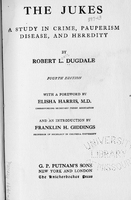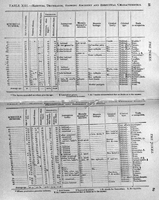Controlling Heredity
Robert Dugdale's The Jukes

Robert Louis Dugdale (American, 1841 – 1883)
The Jukes: A Study in Crime, Pauperism, Disease, and Heredity.
New York: G.P. Putnam's Sons, 1910.
Ellis Library 364 D87j4
University of Missouri
Full text in Google Books

Robert Louis Dugdale (American, 1841 – 1883)
The Jukes: A Study in Crime, Pauperism, Disease, and Heredity.
New York: G.P. Putnam's Sons, 1910.
Ellis Library 364 D87j4
University of Missouri
Full text in Google Books
Robert Dugdale worked as a stenographer with strong avocational interest in social betterment and corrections. As part of his responsibilities as a member of the Prison Association of New York, he was charged with inspecting and reporting on several county jails in upstate New York.
During these visits to penal institutions, Dugdale observed that many inmates were related to one another by blood or marriage. He interviewed inmates and their relatives in Ulster County and began constructing a detailed genealogical study of the group he called, for reasons of privacy and simplicity, the Jukes family. The Jukes were not an actual family, consisting instead of over 40 families with only 540 of its 700 members related by blood. His 1875 report to the Prison Association was published in 1877 as The Jukes: A Study in Crime, Pauperism, Disease and Heredity.
The Jukes was the first in a long series of “degenerate family” studies published well into the first quarter of the twentieth century, with manufactured family names such as Kallikak, Nam, Win, Hickory, and Hill Folk. Dugdale’s study differed from most of the subsequent ones in that he believed the environment to be as important to the development of degenerates as heredity. He urged public welfare reform and social and educational assistance to the poor, diseased, and uneducated.
On display are tabulations of ancestry and individual characteristics of “habitual drunkenness” and its attendant defects.